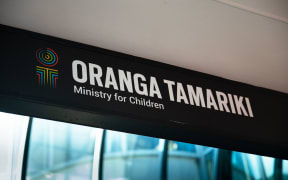
Ruthless-Empire Photo: Screenshot / Stuff
As the news of toddler Ruthless-Empire's death unfolded, his whānau responded by making various claims online.
Platforms such as Facebook, Instagram and TikTok have seen people who were in the Lower Hutt house the night Baby Ru suffered blunt force trauma to his head, trading claims about what happened.
The child's mother has called it "murder". Another woman claimed she'd been wrongly accused before posting her own accusations.
Under sub judice rules, journalists are prohibited from reporting anything which may prejudice the right to a fair trial when a person is arrested, or likely to imminently be arrested.
Police have indicated there are three people of interest who were at the house at the time Baby Ru sustained his injuries.
Publishing claims and identifying those who might be involved, including on social media, could be problematic, according to lawyer Marie Taylor-Cyphers.
"Effectively, it's defamation ... but in reality, if a whānau is disadvantaged and grieving, they are not going to take action".
Taylor-Cyphers, whose Master's thesis was on reducing the risk of child homicide in the family home, believes laws had not kept up with social media. She acknowledged there was legal recourse through the Harmful Digital Communications Act, "but I honestly don't think anyone would do it".
There's also the issue of fair trial rights. Taylor-Cyphers believes it is unrealistic to think potential jury members will put aside what they've read on social media or in the mainstream media.
Australian media expert Johan Lidberg believes the Baby Ru case could trigger a review of New Zealand's sub judice laws.
Lidberg is the head of journalism at Monash University in Melbourne who previously worked as a foreign correspondent, presenter and news editor at the Swedish Broadcasting Corporation.
He claims that social media claims seen in the Baby Ru case are not unique and are a global issue that needs to be discussed.
Lidberg recalls a similar situation in Australia in 2019 when Aiia Maasarwe was gruesomely murdered by Codey Herrmann as she walked home from a night out with friends in Melbourne.
Afterwards, on a Facebook page, members of the public posted comments that were "clearly bordering on sub judice", Lidberg said. Eventually, police had to ask the public to stop posting on the page as there was a serious risk of prejudicing the trial.
"In this particular case, just like Baby Ru, it wasn't the media that were the transgressors. People in the media know what contempt is, but there's a low level of understanding amongst the public."
These days, every person who owns a smart device is now a publisher, Lidberg says.
Because of that, he believes every child should be taught media literacy in their first year of school to stop vulnerable people, like Ru's whānau, being exploited.
Lidberg thinks ethics should weigh heavily in any decision to post online.
"You do have an obligation to report as much as you can because there's a high public interest, but you've got to weigh that up all the time with what will be used in court by both sides".
"I think you have to be really restrictive, especially in cases like this that are so inflammatory and so hard to sort out what's what".
While there's no general rule, Lidberg favours erring on the side of caution and believes countries like the United Kingdom, Australia and New Zealand need heavier restrictions around naming protocols.
"There is a really strong inclination to name criminal suspects before they have been charged, when there is no public interest at all. In Baby Ru's case, the family has no public role, they are not public people. Maybe it should have been considered not to name at all in this case".
Overall, the public has to rely on journalists "doing the right thing" and living by a code of conduct which says they have an ethical obligation to inform people of the consequences publishing could have on them.

Chris Wilkinson-Smith Photo: Stuff / David Unwin
Criminal Bar Association president Chris Wilkinson-Smith said posting on social media during an active police investigation is dangerous and can end with a contempt of court charge.
Although there is a risk that jurors and witnesses could be swayed by social media, defendants who have posted about a crime prior to their arrest, can also end up making life tough for themselves, Wilkinson-Smith said, particularly when a large part of the material police provide to a defendant's lawyer is social media data police have gathered, he added.
"Police see it as a very important part of the investigation."
He said while the court has powers to have prejudicial items taken down, it's a "cumbersome" process and even when successful, depending on the platform - many of which are based overseas - it can be tough to figure out who to lodge a complaint with.
Social worker and child protection researcher, Dr Eileen Joy, said there's a wider ethical issue to consider when trawling through people's social media accounts.
In some cases, like Baby Ru's, it may be justified, but needs to be transparent, she said.
"I think we need to be careful about claiming when someone puts something on social media it is instantly public."
She said it was akin to driving past a client's house and looking through the windows - while legal, she didn't believe it was ethical.
"Look at the way that people argue on social media pages. They get dug into positions, so I think we need to be very careful about using the words that people are saying on social media as truth."
"Yes, it's one part of the story, but it's not the whole story."
- This story was first published by Stuff




